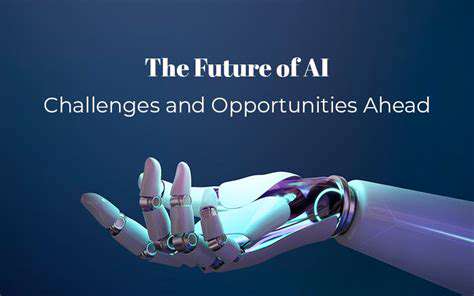AI Driven Diagnostics: From Symptoms to Solutions

Beyond the Visual: AI's Transformative Role in Patient Diagnostics
Contemporary healthcare is experiencing a revolution as artificial intelligence (AI) expands its diagnostic capabilities far beyond image analysis alone. This broader analytical scope enables a more complete evaluation of patient health status, potentially facilitating earlier detection of conditions and more individualized care plans. Modern AI solutions can process diverse data streams including comprehensive medical histories, lifestyle indicators, and even molecular-level genetic information, uncovering connections that might elude traditional diagnostic methods.
The ramifications of this comprehensive approach resonate across medical disciplines. From detecting subtle variations in laboratory results to anticipating possible health complications, AI's capacity to synthesize enormous datasets opens new frontiers in preventive medicine and health management.
AI-Powered Predictive Modeling for Enhanced Patient Outcomes
The prognostic capabilities of AI are transforming patient care paradigms. By examining historical treatment data and outcomes, AI models can identify risk indicators and predict potential health developments before clinical manifestation. This forward-looking perspective enables preemptive medical interventions, ultimately improving recovery rates while reducing overall healthcare expenditures.
These predictive systems also contribute to more efficient resource distribution and hospital workflow optimization, fostering leaner, more effective healthcare operations. Envision clinical environments where AI systems alert practitioners to emerging complications, allowing for timely therapeutic modifications.
Personalized Treatment Plans and Enhanced Patient Experience
AI facilitates the development of customized treatment regimens aligned with individual patient characteristics. By integrating genetic predispositions, medical background, and lifestyle considerations, AI can recommend therapeutic approaches with the highest probability of success.
This personalization extends beyond clinical interventions, improving overall patient engagement. Imagine healthcare systems that automatically coordinate appointments, deliver tailored educational content, and provide individualized support through multiple communication platforms.
AI's Role in Streamlining Administrative Tasks
The influence of AI in healthcare extends to operational domains, automating numerous administrative functions. Intelligent systems can manage appointment scheduling, maintain electronic health records, and process insurance transactions. This automation liberates clinical staff from routine tasks, allowing greater focus on direct patient care.
Optimizing these support processes not only boosts operational efficiency but also reduces administrative errors and enhances patient satisfaction. The resulting cost efficiencies enable healthcare providers to adopt more patient-focused service models.
Ethical Considerations and Future Directions
As AI becomes increasingly embedded in healthcare systems, addressing ethical implications remains paramount. Protecting patient confidentiality, ensuring data integrity, and establishing transparent guidelines for algorithmic development represent critical components of responsible AI implementation.
The prospective applications of AI in medicine continue to expand. Ongoing advancements in computational linguistics and machine intelligence will likely yield increasingly sophisticated diagnostic tools. This evolution promises healthcare systems characterized by greater efficiency, personalization, and ultimately, improved clinical outcomes.
The Future of AI-Driven Diagnostics: Challenges and Opportunities

AI's Potential in Early Disease Detection
The healthcare sector is undergoing radical transformation through artificial intelligence (AI), particularly in the domain of early disease identification. AI systems can evaluate enormous quantities of clinical information – including diagnostic images, laboratory findings, and patient records – to discern subtle indicators that might escape human detection. This capacity for comprehensive, rapid data analysis could enable earlier diagnosis, permitting more timely and effective medical interventions with consequent improvements in patient prognosis. For many conditions, early detection proves critical, allowing therapeutic measures to commence before disease progression, potentially averting serious complications.
The evolution of AI-based diagnostic solutions holds transformative potential for medical practice. By automating the interpretation of complex clinical data, AI can dramatically reduce diagnostic inaccuracies while improving detection precision, enabling more targeted and effective treatment strategies. This proves particularly valuable for conditions where early identification is paramount, including malignancies, cardiovascular pathologies, and neurological disorders. The potential public health benefits are substantial.
Improving Accuracy and Efficiency
AI stands to significantly enhance both the precision and productivity of diagnostic procedures. By handling routine analytical tasks and providing clinicians with synthesized insights, AI can optimize professional time allocation for complex cases. These efficiency gains may translate to reduced diagnostic waiting periods, improving overall healthcare accessibility.
Moreover, AI models trained on extensive medical image archives and patient databases can identify nuanced patterns and abnormalities potentially overlooked during manual review. This diagnostic refinement facilitates earlier and more accurate disease identification, supporting more effective therapeutic approaches and better clinical outcomes. The potential reduction in diagnostic errors could profoundly impact global healthcare systems.
Personalized Medicine and Treatment
Among the most promising aspects of AI-enhanced diagnostics is the advancement of personalized medicine. AI algorithms can assess individual patient parameters including genetic susceptibility, lifestyle factors, and environmental exposures to determine disease risk profiles. This individualized approach facilitates more precise therapeutic selection, maximizing treatment benefits while minimizing adverse effects.
By customizing medical interventions according to each patient's unique characteristics, AI can optimize clinical results and enhance overall wellbeing. This paradigm supports more effective strategies for chronic disease prevention and management. The ongoing development of AI diagnostic technologies is paving the way for increasingly patient-centered healthcare models.
